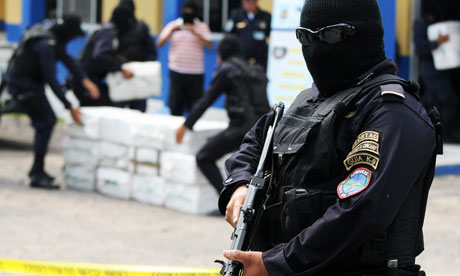The tireless Dana Frank has a brand new piece up at Foreign Affairs about the Obama administration’s support of the 2009 military coup in Honduras, and how US military funding “has increased every year since” despite a dramatic increase in human rights abuses.
“Since early 2010, there have been more than 10,000 complaints of human rights abuses by [US funded and trained] state security forces,” she writes, and “in many ways, Washington is responsible for this dismal turn.”
The situation brings back haunting memories of other U.S. involvements in Latin America. Washington has a dark track record of supporting military coups against democratic governments and then funneling money to repressive regimes. In 1964, the United States backed a military coup in Brazil; in 1973, it supported a military coup headed by Augusto Pinochet in Chile; and during the 1980s, it threw millions of dollars at the leaders in El Salvador. All of these U.S.–backed governments ruled with enormous brutality. In Honduras today, the United States’ hands are already dirty: A botched drug raid in the Moskitia region on May 11, carried out by agents of the U.S. Drug Enforcement Administration and Honduran security forces, left four civilians dead, two of whom were pregnant women.
The increased support for the abusive and corrupt military regime in Honduras has occurred in tandem with an increase in US military presence in the country and penetration by commando-style militias from the Drug Enforcement Administration. There have been a number of cases in recent months of joint US-Honduran raids and gunfights with alleged drug traffickers, but it hasn’t cracked down so much as it has made the country more dangerous. In one such incident in May, DEA agents and Honduran forces shot and killed four civilians, including two pregnant women, with total impunity beyond having to say they were sorry.
The drug war is at best a side issue for the US in Honduras, especially considering the regime Washington supports is rife with politicians and government officials who themselves participate in the drug trade and organized crime. Dana Frank sheds some light on the true strategic calculus:
The State Department is pursuing such a misguided policy for larger strategic reasons in the region: to push back against the governments in Argentina, Bolivia, Brazil, Ecuador, El Salvador, and others, which have moved considerably to the left in the last 15 years. Above all, Washington’s Honduras policy is a deliberate message to Venezuelan President Hugo Chávez. Endorsing the coup served as a not-so-subtle threat that the others could be next. Paraguay only proves the point further — in June, the State Department looked the other way when Paraguayan President Fernando Lugo was overthrown.
So Washington is afraid of what it has always been afraid of in Latin America: losing control of it. Too many countries are unwilling to simply obey US demands, therefore, support for tyranny is justified.



